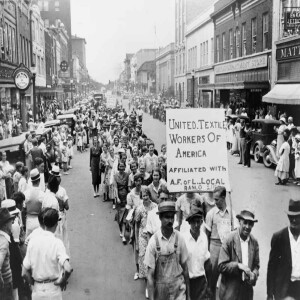Episodes

Friday Sep 13, 2024
September 13 - Shoot to Kill Orders in Rhode Island
Friday Sep 13, 2024
Friday Sep 13, 2024
That was the day Rhode Island Governor Theodore Green demanded that federal troops be sent to crush a textile strike in his state.
The General Textile Strike, then in its second week, stretched across the Piedmont from New England to Georgia.
Green declared, “We are face to face, not with a textile strike but with a communist uprising.”
His demands came after days of pitched battles between thousands of strikers and the Rhode Island National Guard in Saylesville and Woonsocket.
Secretary of War George Dern assured the governor and the press that 3,000 combat troops were ready and available for immediate duty in Rhode Island.
President Roosevelt declined to send federal troops.
But the state assembly authorized the governor to close the mills and appropriated $100,000 in funds to beef up state police forces.
The governor then directed Rhode Island’s police chiefs to round up all communists on charges of inciting riots in textile centers across the state.
It gave local authorities the pretext to round up and arrest over 200 alleged agitators, strike leaders, militants and radicals.
Over the course of four days, three strikers had been killed, including Charles Gorcynski at Saylesville and Jude Courtemanche, at Woonsocket.
Hundreds had been seriously injured in the two cities.
Seven of the sixteen strikers who had been shot by state troops were near death.
State National Guardsmen had been given “shoot to kill” orders to protect textile mills and scabs.
Once the Governor shut down the mills, police forces easily arrested dozens of flying squadron picketers and established martial law like conditions, though it was never officially established.
Within days, the strike would be quelled in Rhode Island.


Comments (0)
To leave or reply to comments, please download free Podbean or
No Comments
To leave or reply to comments,
please download free Podbean App.